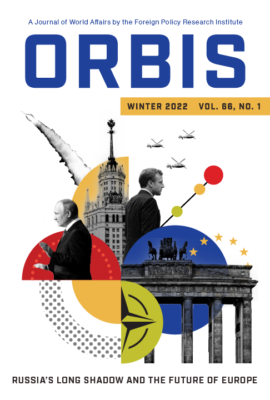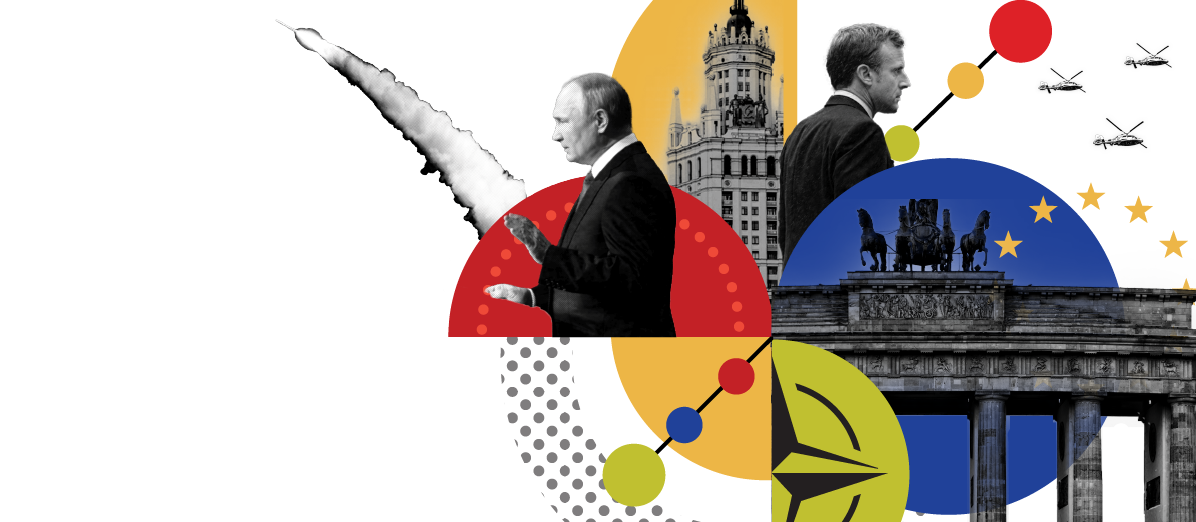A nation must think before it acts.
 Access the Winter 2022 of Orbis here.
Access the Winter 2022 of Orbis here.
First, we need to remedy a serious oversight in not recognizing the editors who assembled the Fall 2021 special issue of Orbis, “Emerging Voices: Catalysts for Change,” developed under the aegis of Metropolitan State University Denver. We want to ensure that Professors Matthew Makley, Sheila Rucki, and Robert Preuhs are recognized for their work, and we thank MSU Denver’s President, and Orbis editorial board member, the Honorable Janine Davidson, for her role as the “catalyst” for that issue. Furthermore, in this Winter 2022 issue, we feature an additional article—Wendolyn Weber’s examination of the cultural mechanics of social inequality and global cultural interdependence—to round out that collection.
The primary focus of this present volume, however, is the shadow cast by a resurgent Russia over Europe at a time when the future direction of the continent is unclear, as Chancellor Angela Merkel steps down after being at Germany’s helm for 15 years. Moreover, the Biden administration is attempting to navigate rebalancing U.S. engagement with Europe with managing the pivot towards the Indo-Pacific basin, while considering where to prioritize Russia in that process. When we first conceived of this theme, we could not know that November 2021 would be marked by a triple challenge: a migration crisis on the border between Belarus and the eastern members of the North Atlantic Treaty Organization (NATO) and the European Union (EU); the threat of a resumption of open conflict between Russia and Ukraine, which, in turn, impacts European security and the cohesion of the NATO alliance; and an energy shortage as Russia and the West maneuver over the Nord Stream 2 pipeline. The Foreign Policy Research Institute’s Creative Director, Natalia Kopytnik, has created a particularly apropos cover for this issue—30 years after the collapse of the Soviet Union, we are not celebrating a Europe “whole and free,” but are facing increased conflict and division.
It is important to recall history, however, and the source of our optimism that the end of the Cold War would usher in a new era for the Euro-Atlantic region. Ambassador John Cloud, with Kenneth Sandler, takes us back to 1989 and the effort to encourage the process of democratic enlargement. They re-examine the lessons of policy towards Poland and how it succeeded in starting the process that led to European Union and NATO enlargement. (Perhaps on a more pessimistic note, Jakub Grygiel’s review of John LeDonne’s work on Russia’s historical experiences in consolidating itself as a Eurasian power suggests that 1989, far from being the end of history, represented only a temporary detour and that Russian policy in the twenty-first century hearkens back to older patterns and traditions.) From a revisiting of past history, we proceed to the current day. The foreign policy spokesman for the Social Democrats, and Bundestag member, the Honorable Nils Schmid, discusses where German foreign policy—on Russia, China, the trans-Atlantic relationship, and the future of Europe—may head in the 2020s in a post-Merkel era. Valbona Zeneli and Michael Ryan assess where the Euro-Atlantic relationship is headed with an America that is “back” but with Europe unsure of its role and focus in a world where, as Josef Borrell has noted, the global center of gravity is shifting eastwards. Finally, Dan Hamilton gives us a sense of where NATO’s new strategic concept is headed and how it may define the Euro-Atlantic security relationship for the next decade. If, after 1989, we hoped that NATO’s core mission, in the words of Lord Ismay, to “keep the Russians out,” was now over, the question of how to deal with a resurgent Russia that increasingly does not desire to be integrated into the Euro-Atlantic world by accepting its norms and regulations has returned as a central issue for European security.
This brings us to the question of Russia. First, if we are seeing intensification of competition—with the attendant risk of increased clashes—between Russia and the West, then Simon Sarandzhyan’s article is an attempt to understand how, when, and under what conditions Russia uses force. Lukas Milevski focuses on how the Russian national security establishment manages escalation and how this might unfold in the context of a Baltic region where nuclear weapons might not be an option for deterrence. Andreas Umland takes a hard look at Germany’s traditional dual-track approach to Russia, especially continued engagement with Moscow, in light of what is happening in Ukraine. With the energy crisis highlighting where Europe gets its natural gas, Stephen Blank posits how the Balkans can play a pivotal role in helping to diversify Europe’s sources of supply and enhance energy security. Finally, Lawrence Rubin, in reviewing former Undersecretary of State for Arms Control Rose Gottemoeller’s book on negotiating the new Strategic Arms Reduction Treaty (START), perhaps points us in a more hopeful direction: that, at least in regard to making the world a safer place from the scourge of nuclear weapons, it is possible to find common ground between Russia and the United States.
With this issue’s focus on Europe and Russia, a review of Ray Takeyh’s The Last Shah may appear out of place. But this work serves as an important reminder that policy, not just towards Iran, but anywhere, cannot be made under the shadow of flawed historical analyses that go unchallenged. The book provides a coda to an issue which asks us to re-examine assumptions—about Russian intentions and capabilities, U.S. interests and focus, and European preferences and perspectives—which policymakers in Washington, and Moscow, and points in between take for granted.



